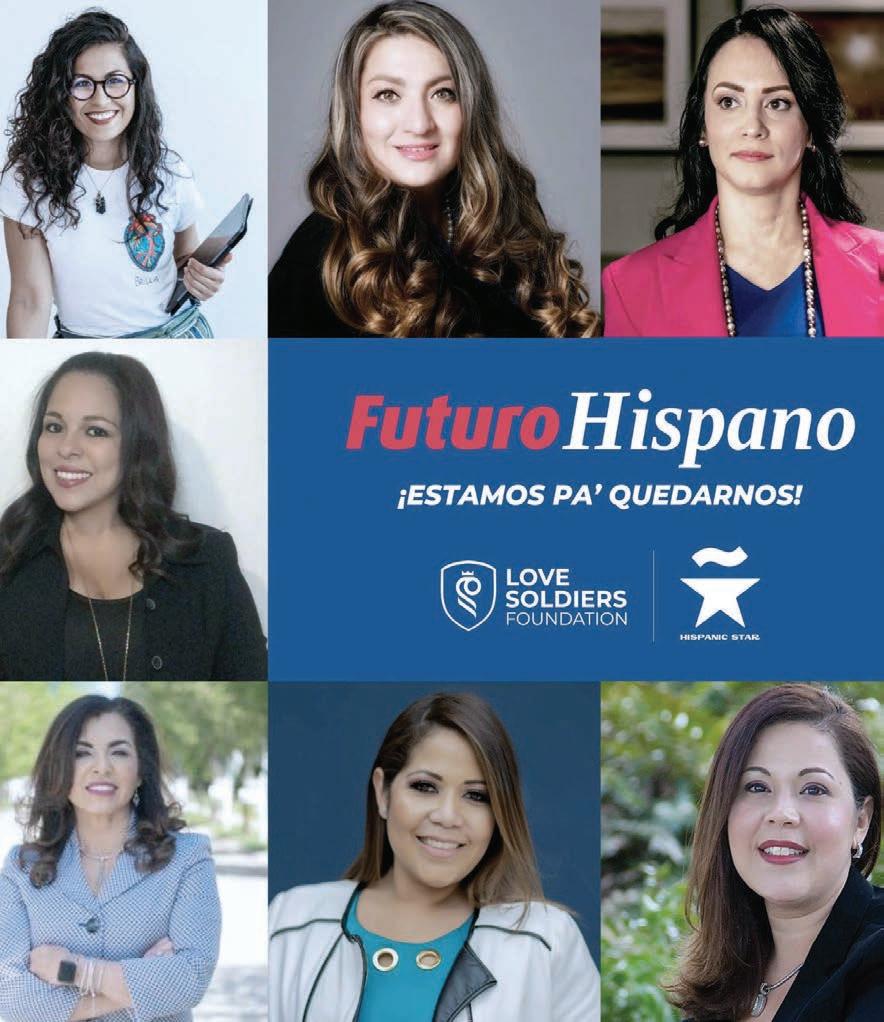
27 minute read
LEADERS LÍDERES
2020 CENSUS HISPANIC STAR'S RACE AGAINST THE CLOCK HISPANIC STAR PHILLY TEAMS UP WITH LOVE SOLDIERS FOUNDATION IN “FUTURO HISPANO” CAMPAIGN TO INCREASE CENSUS RESPONSE.
LA ESTRELLA HISPANA DE FILADELFIA SE UNE A LA FUNDACIÓN LOVE SOLDIERS EN LA CAMPAÑA "FUTURO HISPANO" PARA AUMENTAR LA RESPUESTA DEL CENSO.
Advertisement
By | Por: ERICKA CONANT AL DÍA News staff writer
ENGLISH
Now, more than ever, it is the responsibility of Latinos to fill out the census, or else miss-out on necessary funding and representation.
The 2020 Census is ending early, thanks to the Trump administration’s decision to cease data collection and outreach sooner than initially planned, leading to massive undercounts within BIPOC communities.
The Latinx population is already at a higher risk of being undercounted because of language barriers, fears over immigrant status, and for living in hardto-reach areas.
Latinx leaders are continuously pushing for increased visibility and accessibility to fill out the census, especially now, as a global pandemic has overshadowed many issues.
But at some point, it is not the responsibility of our leaders, but for citizens to take the initiative.
Latinos are not filling-out the 2020 Census at the levels they should, and in areas with large Latinx populations, the self-response rate is alarmingly low.
Such is the case of Rep. Nanette Barragán’s district in Los Angeles.
In 2010, her district had a self-response rate of
ESPAÑOL
Ahora, más que nunca, es responsabilidad de los latinos llenar el censo, bajo riesgo de perder la financiación crucial y la representación.
El Censo 2020 está terminando antes de tiempo, gracias a la decisión de la administración Trump de terminar la recopilación de datos y la divulgación antes de lo previsto inicialmente, lo que podría conducir a subcuentas masivas dentro de las comunidades BIPOC.
La población Latinx ya corre un mayor riesgo de ser subestimada debido a las barreras lingüísticas, los temores sobre la condición de inmigrante y por vivir en zonas de difícil acceso.
Los líderes Latinx están presionando continuamente para que se aumente la visibilidad y la accesibilidad para rellenar el censo, especialmente ahora, ya que muchas cuestiones han quedado eclipsadas por una pandemia mundial.
Pero en algún momento, no es responsabilidad de nuestros líderes, sino de los ciudadanos tomar la iniciativa.
Los latinos no están llenando el censo de 2020 a los niveles que deberían, y en áreas con grandes poblaciones Latinx, la tasa de auto-respuesta es alarmantemente baja.
Tomemos por ejemplo, el distrito de la representante Nanette Barragán en Los Ángeles.
En 2010, su distrito tuvo una tasa de auto-respuesta del 68,6%. Ahora con el corte de un mes y el fin de la difusión en los hogares casi dos semanas antes en algunas
The Hispanic Star initiative seeks to encourage Latinx participation in the 2020 Census. Photo by Hispanic Star Philadelphia
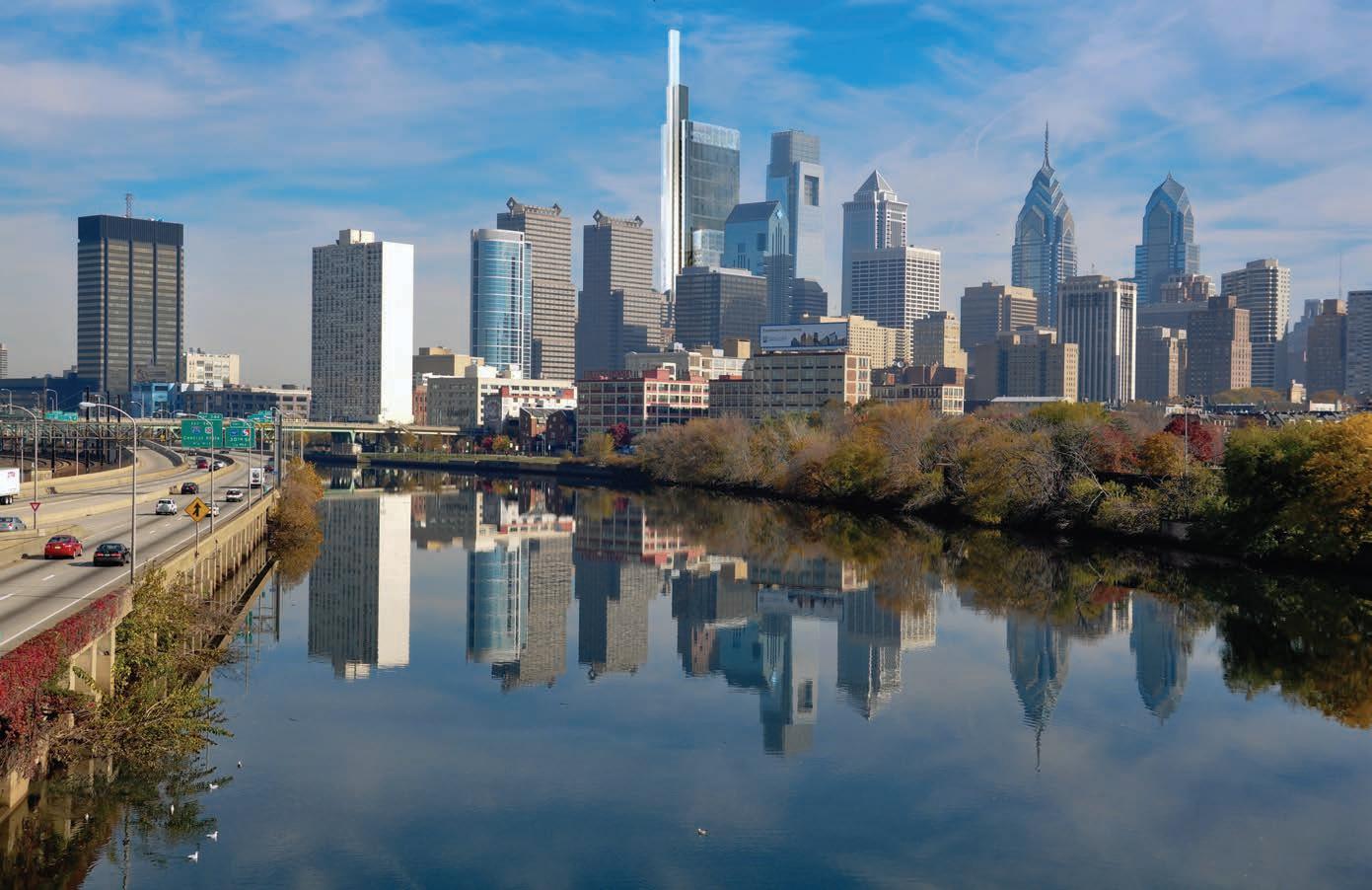
The Love Soldiers Foundation, in collaboration with We are all Human, and its Hispanic Star initiative, is oering a $10,000 award to five people, and more incentives to encourage the Latinx community to complete the census. Photo by Facebook/Hispanic Star Philadelphia
La Fundación Love Soldiers, en colaboración con We are all Human, y su iniciativa Hispanic Star, están ofreciendo un premio de 10.000 dólares a cinco personas, y más incentivos para impulsar a la comunidad Latinx a completar el censo. Foto de Facebook/Hispanic Star Philadelphia
ENGLISH
ESPAÑOL
68.6%. Now with the one-month cut-off and the ending of household outreach nearly two weeks early in some areas, her district is just at 60.1%.
“We cannot let them erase us,” Barragán wrote.
“Futuro Hispano” is a national campaign aimed to combat this disparity.
The Love Soldiers Foundation, a non-profit organization based in Texas, is responsible for the campaign in collaboration with We are all Human, a New York-based nonprofit, and their initiative Hispanic Star.
The groups offer a $10,000 prize to five people, and more incentives to drive the Latinx community to complete the census.
“Our mission is to incentivize our Hispanic community around the United States to make themselves count for the Census 2020. This will increase our Hispanic representation and therefore allocate the right resources for our communities,” the Hispanic Star hub in Philadelphia told AL DÍA.
“The 2020 Census counts every person living in the United States on April 1 — no matter where they are from, why they are here in the United States, and whether or not they are documented. This includes temporary workers, international students, and workers on assignment from overseas.” zonas, su distrito está ahora a sólo 60,1%.
“No podemos dejar que nos borren”, escribió Barragán.
“Futuro Hispano” es una campaña nacional dirigida a combatir la disparidad.
La Fundación Love Soldiers, una organización sin ánimo de lucro con sede en Texas, en colaboración con We are all Human, una organización sin ánimo de lucro con sede en Nueva York y su iniciativa Hispanic Star, son los responsables de la campaña.
Los grupos están ofreciendo un premio de 10.000 dólares a cinco personas, y más incentivos para impulsar a la comunidad Latinx a completar el censo.
“Nuestra misión es incentivar a nuestra comunidad hispana en los Estados Unidos para que se cuenten para el Censo 2020. Esto aumentará nuestra representación hispana y por lo tanto asignará los recursos adecuados para nuestras comunidades”, dijo el centro Hispanic Star de Filadelfia a AL DÍA.
“El Censo 2020 cuenta a cada persona que vive en los Estados Unidos el 1 de abril, sin importar de dónde son, por qué están aquí en los Estados Unidos, y si están o no documentados. Esto incluye a los trabajadores temporales, estudiantes internacionales, y trabajadores en misión desde el extranjero”, agregó.
HISPANIC AWARDEE
AN ARCHETYPE OF OUR HISTORY
MONTH 2020 PUBLIC SERVICE CATEGORY
THE DOMINICAN FOR ALL LATINOS IN HARRISBURG


WHAT BROUGHT DANILO BURGOS TO POLITICS? HE WANTED TO BE THE CHANGE IN HIS NORTH PHILLY COMMUNITY.
¿QUÉ LLEVÓ A DANILO BURGOS A LA POLÍTICA? QUERÍA SER EL CAMBIO EN SU COMUNIDAD DEL NORTE DE FILADELFIA.
The road to leading a city for Danilo Burgos came to him at a very young age and amid a tragedy.
Burgos was only a teenager when his uncle was murdered in Philadelphia. Following that, the interaction his family had with the local police department and homicide unit was abysmal at best.
“They wouldn’t even meet with my cousins and my aunt to discuss his case,” he said. “Sometimes it would be blamed on language barriers or they were busy, or they just fl at out didn’t have any info on the case.”
GATHERING PHILLY GROCERS
Though not immediate, three years later, he made the jump to get involved with his community and create change.
In 1997, Burgos, his cousins, and three other local business owners started the Philadelphia Dominican Grocers Association.
Through the organization, the group was able to address issues affecting the bodegas in North Philadelphia that centered around civic issues, interactions with the health and police departments, safety in the community, license inspection, and more.
It’s creation also coincided with an effort from the city in the late 1990’s to start enforcing laws on small businesses. Despite enforcement, the city still lacked a lot of information on actually starting your own business, which the organization also provided.
ENGLISH
GETTING INVOLVED IN LATINO POLITICS
Burgos fi rst got involved in offi ce was when then-Philadelphia Director of Fair Labor Standards, Juan Ramos, ran for an at-large City Council seat in 2000.
Following that, Burgos has been involved in Latino politics ever since. He later dove in at the city level for six years as part of the staffs of councilmembers María Quiñones Sánchez and Allan Domb.
When it comes to infl uential leaders, Councilmember Sánchez is at the top of Burgos’ list.
During his time in her offi ce, she not only infl uenced him, but also the community she served. Seeing the impact she had is what eventually drove him to seek higher offi ce to dictate the policies that affected his community as PA’s fi rst Dominican state rep.
MAKING HISTORY
When speaking of being the fi rst Dominican in PA’s House of Representatives, Burgos was reminded of the intense community pride he felt just before moving to Philadelphia from Washington Heights in New York City.
Burgos attended P.S. 182 in Washington Heights, New York.
During his time there, he witnessed then-confl ict resolution mediator and volunteer Adriano Espaillat — now a U.S. rep from New York’s 13th district — come to the school and rename it after one of the founding fathers of the Dominican Republic, Juan Pablo Duarte.
ESPAÑOL
El camino para dirigir una ciudad para Danilo Burgos le llegó a muy temprana edad y en medio de una tragedia. Burgos era sólo un adolescente cuando su tío fue asesinado en Filadelfi a. Después de eso, la interacción de su familia con el departamento de policía local y la unidad de homicidios fue pésima, en el mejor de los casos. "Ni siquiera se reunían con mis primos y mi tía para discutir su caso", dijo. "A veces argumentaban las barreras del idioma o estaban ocupados, o simplemente no tenían ninguna información sobre el caso".
REUNIENDO A LOS COMERCIANTES DE FILADELFIA
Aunque no fue de inmediato sino tres años después, Burgos dio el salto para involucrarse con su comunidad y crear un cambio.
En 1997, Burgos, sus primos y otros tres propietarios de negocios locales fundaron la Asociación de Comerciantes Dominicanos de Filadelfi a.
A través de la organización, el grupo pudo abordar los problemas que afectaban a las bodegas del norte de Filadelfi a y que se centraban en cuestiones cívicas, la interacción con los departamentos de salud y de policía, la seguridad en la comunidad, la inspección de licencias y otras cuestiones. Su creación también coincidió con un esfuerzo de la ciudad a fi nales del decenio de 1990 para empezar a aplicar las leyes sobre las pequeñas empresas. A pesar de las fuerzas del orden, la ciudad todavía carecía de mucha información sobre cómo iniciar su propio negocio, que la organización también proporcionó.
INVOLUCRARSE EN LA POLÍTICA LATINA
La primera vez que Burgos se involucró en el cargo fue cuando el entonces Director de Estándares Laborales Justos de Filadelfi a, Juan Ramos, se postuló para un puesto en el Consejo de la Ciudad en el año 2000.
Desde entonces, Burgos ha estado involucrado en la política latina. Más tarde se sumergió en el nivel de la ciudad durante seis años como parte del personal de los concejales María Quiñones Sánchez y Allan Domb.
Cuando se trata de líderes infl uyentes, la concejal Sánchez está en la parte superior de la lista de Burgos.
Durante el tiempo que estuvo en su ofi - cina, no sólo lo infl uenció a él, sino también a la comunidad a la que servía. Ver el impacto que ella tuvo es lo que fi nalmente lo llevó a buscar un cargo más alto para dictar las políticas que afectaron a su comunidad como el primer representante estatal dominicano de PA.
HACIENDO HISTORIA
Al hablar de ser el primer dominicano en la Cámara de Representantes de PA, Burgos recordó el intenso orgullo comunitario que sintió justo antes de mudarse a Filadelfi a desde Washington Heights en la ciudad de Nueva York.
Burgos asistió al P.S. 182 en Washington Heights, Nueva York.
Durante su estancia allí, fue testigo de cómo el entonces mediador de resolución de
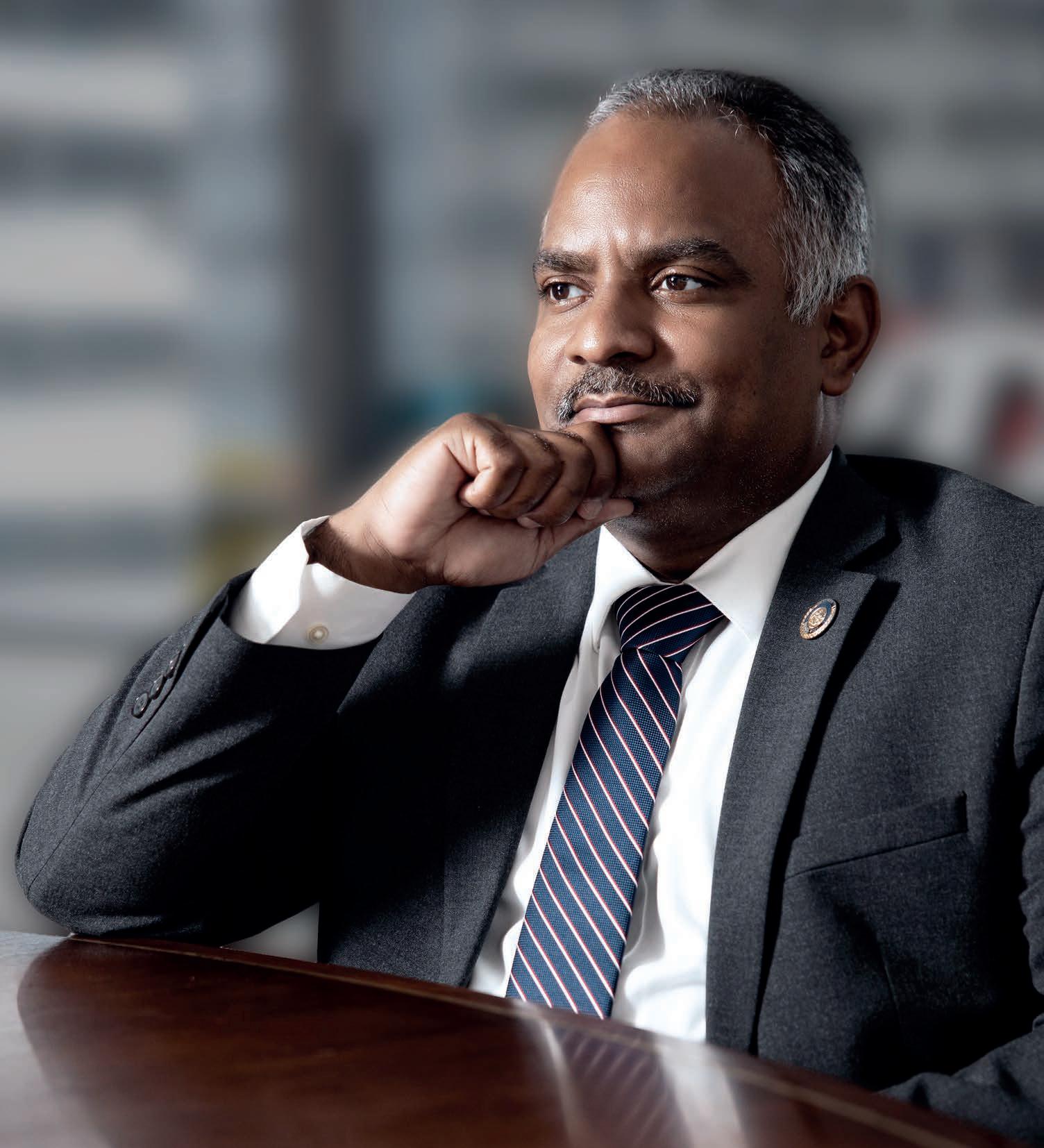
MONTH 2020
Burgos moved from Washington Heights in Manhattan to Philadelphia in 1992, where his family started a bodega business. Photo by Harrison Brink / AL DIA News
Burgos se mudó de Washington Heights en Manhattan a Filadelfi a en 1992, donde su familia comenzó un negocio de bodegas. Foto de Harrison Brink / AL DIA News
MONTH 2020
Since his formative years at Olney High School, Burgos has been involved in community organizing and politics. Photo by Harrison Brink / AL DIA News
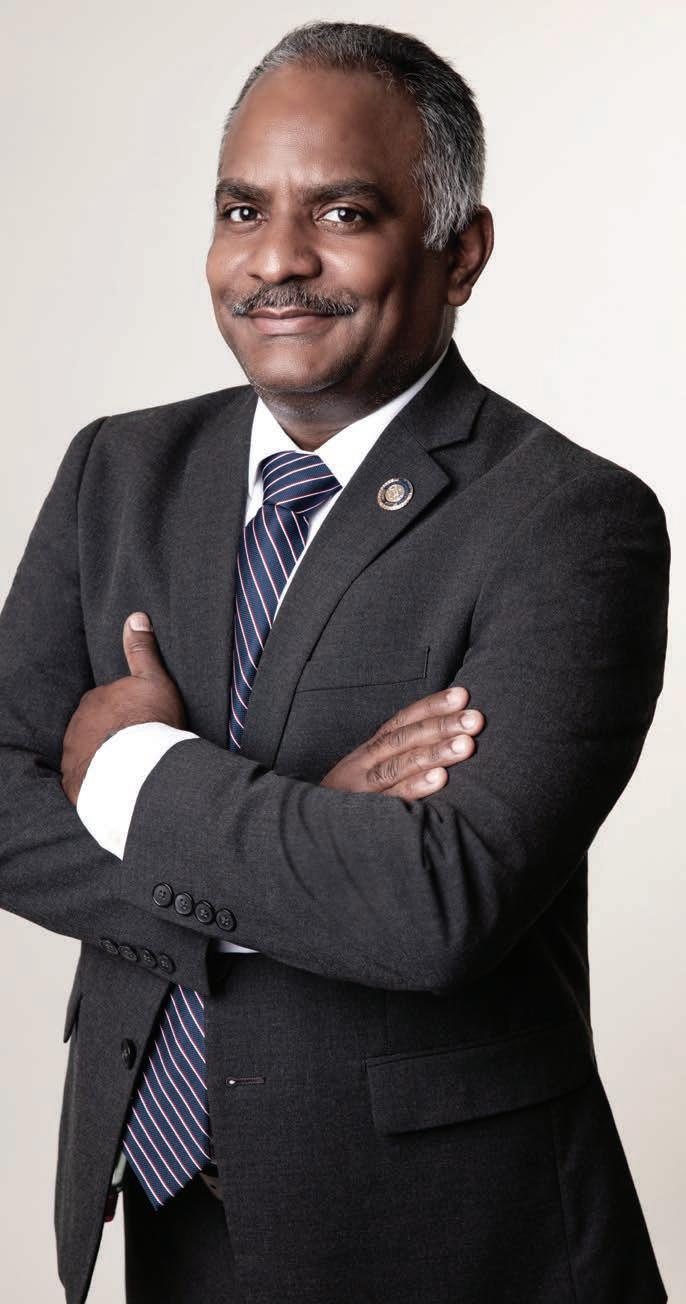
Desde sus años de formación en la escuela secundaria Olney, Burgos ha estado involucrado en la organización de la comunidad y la política. Foto de Harrison Brink / AL DIA News
ENGLISH
From pag. 12 |
“It was a moment that I remember very dearly because there was a lot of pride, a sense of accomplishment at the time for a very Dominican-populated community in Washington Heights,” Burgos shared.
Now, he plays a similar role for his community in North Philadelphia in Harrisburg.
“It is a huge honor to hear people from the Dominican community saying thank you for helping us in our community, and for helping us believe that we can achieve high goals here in Philly, as well as helping us believe that Pennsylvania is our new home,” Burgos shared of his experience making history.
However, he noted that he did not just see himself as one ethnicity, but as a Latino wanting to help his other fellow Latinos.
BUILDING TRUST
During these times of a pandemic and social uprisings over racial equality, building and maintaining trust is a challenge. For Burgos, to create trust, you have to show it through your work and engagement with the community by allowing others to also be at the table.
However, throughout the civil unrest that has unfolded over the last four months, he has admitted it is hard to maintain that trust.
“We’re still discussing issues that were prevalent in 1960 and that is the most disheartening part,” Burgos said. “No matter what work has been put into civil rights, this is 2020 and we’re still fi ghting for the same issues.”
Much like his initial motivation to run for offi ce, Burgos drove home that we need to be the change we want to see in the community to fi nally win those long-standing fi ghts.
It “takes us.”
“Most importantly it’s about respect and how we respect one another and get as close to equality as possible instead of just having it be a hashtag,” he said. “Rather, let’s have it incorporated as a way of life so no one feels like they don’t belong, particularly in Philadelphia.”
The way he proposes change is by the continuation of work. Continuing to use public service systems to represent the communities and not just the majority of one group.
NORTH PHILLY IN HARRISBURG
It’s why a big part of his election to Harrisburg was to fi nally put North Philadelphia’s issues at a state level. In doing so, Burgos has reintroduced the city by emphasizing positives like the entrepreneurial spirit of the community he serves and its hard-working people.
A hard-working people that also possess immense talent.
“A resilient community that has the desire and the will to succeed,” Burgos said.
However, he says there are still issues the city needs to address and overcome. As always, the solutions rise from the collective — from Dominican grocers in North Philadelphia all the way to state leaders in Harrisburg.
“It’s going to take all of us working together. All the politicians, not just one person,” said Burgos.
Despite the recognition as AL DÍA’s Public Service archetype in 2020, he says what it takes to lead in his position is working tirelessly, indiscriminately, and without worrying about such accolades.
“Just get the job done,” said Burgos.
And he’s got a load of jobs to get done long into the future regarding his community.
RETHINKING EDUCATION POLICY
High on the list is bringing education reform to North Philadelphia
MONTH 2020
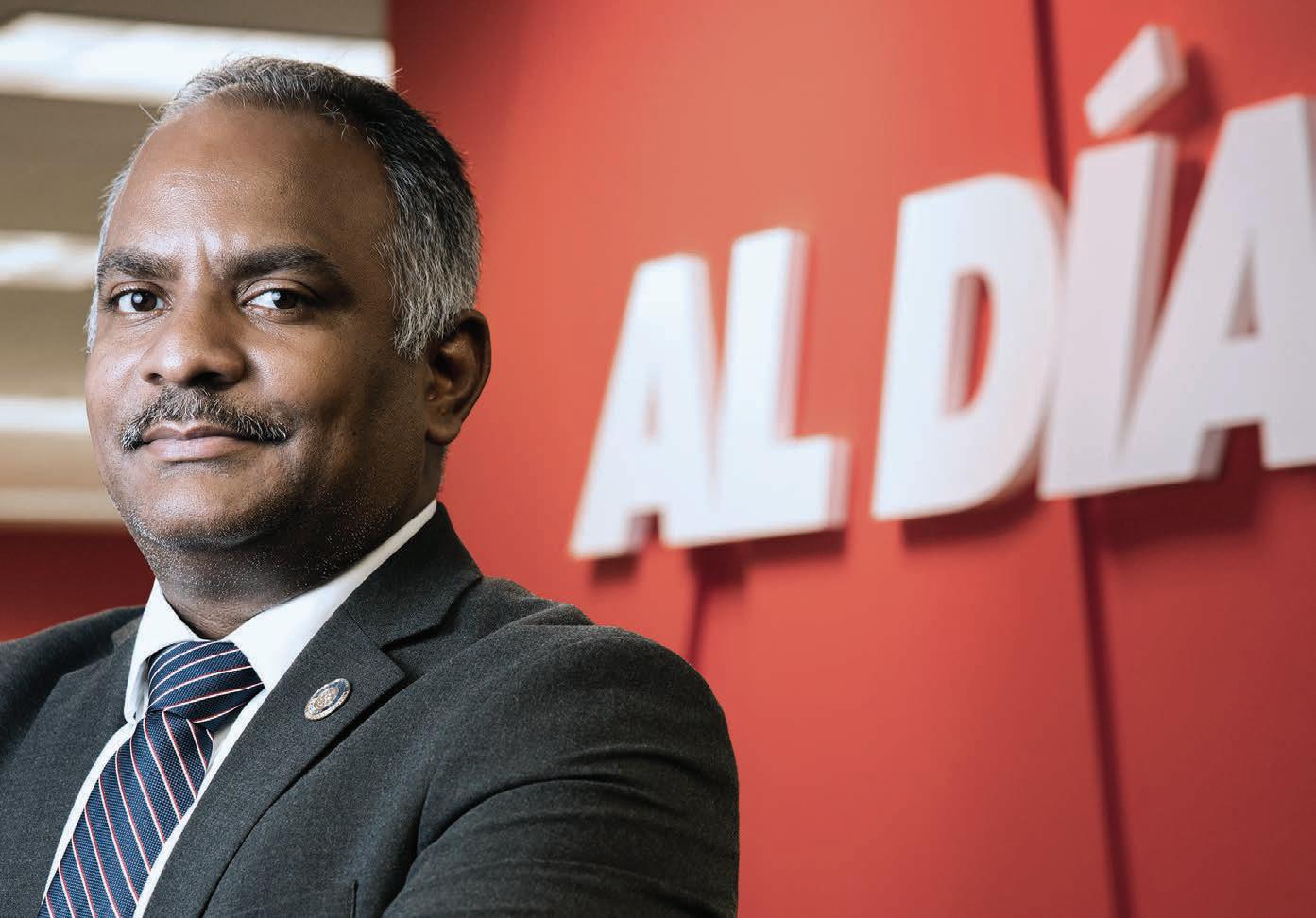
During his time in Councilmember María Quiñones Sánchez' o¡ ce, she not only infl uenced him, but also the community she served. Seeing the impact she had is what eventually drove him to seek higher o¡ ce to dictate the policies that a ected his community as PA’s fi rst Dominican state rep. Photo by Harrison Brink / AL DIA News
Durante su estancia en la ofi cina de la concejala María Quiñones Sánchez, no sólo le infl uyó a él, sino también a la comunidad a la que servía. Ver el impacto que ella tuvo es lo que fi nalmente lo llevó a buscar un cargo más alto para dictar las políticas que afectaron a su comunidad como el primer representante estatal dominicano de PA. Foto de Harrison Brink / AL DIA News
schools to make sure all elementary and high schools kids are achieving and excelling.
“I strongly believe that our educational system is ground zero for us to be able to create real change in our communities,” said Burgos
With students back to school and activists pushing for the #yearofpurpose, Burgos says he wants to go above it being just a hashtag and embracing the work that’s gone into uplifting communities.
“Too many of our Black and Brown communities do not know the sacrifi ces or where they come from. The sweat equity of the hard work that those that came before us put into what we have today, and that has been intentionally swept under the rug,” he said.
By not teaching young people about the past, society risks them repeating the same mistakes, according to Burgos.
But in his mind, that education starts with its wording. RETHINKING AMERICAN EDUCATION
When asked about implementing Black history and ethnic studies, Burgos said it should not have such a label because it IS American history.
Though mainstream teachers may not have wanted to cover it, Burgos emphasizes that we need to be intentional and realize we are ALL Americans.
“For years, the rightful recognition of Black and Brown communities to the growth and to what they represent to the U.S. has not been recognized, and we need to recognize it by calling it what it is: American education,” he said.
The improvements Black and Brown people have made to this country have also not just improved life for themselves, but so all Americans can co-exist.
“We need to reinvent ourselves,” Burgos said.
MONTH 2020
ESPAÑOL
Viene pag. 12|
confl ictos y voluntario Adriano Espaillat -ahora representante estadounidense del distrito 13 de Nueva York- llegó a la escuela y la rebautizó con el nombre de uno de los padres fundadores de la República Dominicana, Juan Pablo Duarte.
“Fue un momento que recuerdo muy bien porque había mucho orgullo, un sentido de logro en ese momento para una comunidad muy dominicana en Washington Heights”, compartió Burgos.
Ahora, juega un papel similar para su comunidad en el norte de Filadelfi a en Harrisburg.
“Es un gran honor escuchar a la gente de la comunidad dominicana decir gracias por ayudarnos en nuestra comunidad, y por ayudarnos a creer que podemos lograr grandes metas aquí en Filadelfi a, así como ayudarnos a creer que Pensilvania es nuestro nuevo hogar”, Burgos compartió sobre su experiencia haciendo historia.
Sin embargo, señaló que no se veía a sí mismo como una sola etnia, sino como un latino que quería ayudar a sus otros compañeros latinos.
CONSTRUIR LA CONFIANZA
En estos tiempos de pandemia y levantamientos sociales por la igualdad racial, construir y mantener la confi anza es un desafío. Para Burgos, para crear confi anza, tienes que mostrarla a través de tu trabajo y compromiso con la comunidad permitiendo que otros también estén en la mesa.
Sin embargo, a lo largo de los disturbios civiles que se han desarrollado en los últimos cuatro meses, ha admitido que es difícil mantener esa confi anza.
“Seguimos discutiendo temas que prevalecían en 1960 y esa es la parte más descorazonadora", dijo Burgos. "No importa el trabajo que se haya hecho en los derechos civiles, estamos en el 2020 y seguimos luchando por los mismos temas”.
Al igual que su motivación inicial para postularse para el cargo, Burgos miró hacia dentro y aseguró que necesitamos ser el cambio que queremos ver en la comunidad para fi nalmente ganar esas largas peleas.
“Nos necesita”.
“Lo más importante es el respeto y cómo nos respetamos unos a otros y acercarnos lo más posible a la igualdad en lugar de que sea sólo un hashtag”, dijo. “Más bien, incorporémoslo como una forma de vida para que nadie sienta que no pertenece, particularmente en Filadelfi a”.
La forma en que propone el cambio es mediante la continuación del trabajo. Continuar utilizando los sistemas de servicio público para representar a las comunidades y no sólo a la mayoría de un grupo.
EL NORTE DE FILADELFIA EN HARRISBURG
Es por eso que una gran parte de su elección en Harrisburg fue poner fi nalmente los asuntos del norte de Filadelfi a a nivel estatal. Al hacer esto, Burgos ha reintroducido la ciudad enfatizando aspectos positivos como el espíritu emprendedor de la comunidad a la que sirve y su gente trabajadora.
Un pueblo trabajador que también posee un inmenso talento.
“Una comunidad resistente que tiene el deseo y la voluntad de triunfar”, dijo Burgos.
Sin embargo, dice que todavía hay cuestiones que la ciudad necesita abordar y superar. Como siempre, las soluciones surgen del colectivo, desde los tenderos dominicanos en el norte de Filadelfi a hasta los líderes estatales en Harrisburg.
“Nos va a llevar a todos a trabajar juntos. Todos los políticos, no sólo una persona”, dijo Burgos.
A pesar del reconocimiento como arquetipo de servicio público de AL DÍA en 2020, dice que lo que hace falta para liderar su posición es trabajar incansablemente, de forma indiscriminada y sin preocuparse por tales elogios.
“Sólo hay que hacer el trabajo”, dijo Burgos.
Y tiene un montón de trabajos para hacer en el futuro con respecto a su comunidad.
REPENSAR LA POLÍTICA EDUCATIVA
Lo primero en la lista es llevar la reforma educativa a las escuelas del norte de Filadelfi a para asegurar que todos los niños de las escuelas primarias y secundarias estén rindiendo y sobresaliendo.
“Creo fi rmemente que nuestro sistema educativo es la base para que podamos crear un cambio real en nuestras comunidades”, dijo Burgos.
Con los estudiantes de vuelta a la escuela y los activistas presionando por el #yearofpurpose, Burgos dice que quiere ir más allá de ser sólo un hashtag y abrazar el trabajo puesto en elevar las comunidades.
“Demasiadas de nuestras comunidades negras y marrones no conocen los sacrifi cios o de dónde vienen. El sudor del trabajo duro que los que nos precedieron pusieron en lo que tenemos hoy, y que ha sido barrido intencionalmente bajo la alfombra”, dijo.
Al no enseñar a los jóvenes sobre el pasado, la sociedad se arriesga a que repitan los mismos errores, según Burgos.
Pero en su mente, esa educación comienza con el discurso.
REPENSAR LA EDUCACIÓN AMERICANA
Cuando se le preguntó sobre la implementación de la historia de los negros y los estudios étnicos, Burgos dijo que no debería tener esa etiqueta porque es historia americana.
Aunque los profesores de la corriente principal no quisieran cubrirla, Burgos enfatiza que necesitamos ser intencionales y darnos cuenta de que TODOS somos americanos.
“Durante años, el reconocimiento legítimo de las comunidades negras y morenas al crecimiento y a lo que representan para los EE.UU. no ha sido reconocido, y necesitamos reconocerlo llamándolo como lo que es: La educación americana”, dijo.
Las mejoras que los negros y los morenos han hecho en este país no sólo han mejorado su vida, sino que también han permitido que todos los estadounidenses puedan coexistir.
“Necesitamos reinventarnos”, dijo Burgos.
The PHA Board meeting will take place at 3 p.m. on September 17, 2020, as previously published, however it will be a virtual meeting. Participation procedures are currently altered due to the COVID-19 pandemic and information on how to participate in the meeting or comment can be found at: www.pha.phila.gov.
QUOTABLE SENTENCES FRASES CITABLES
HE FAILED TO DO HIS JOB – ON PURPOSE
“LA GENTE TIENE MÁS PROBABILIDADES DE SER VACU
NADA SI CONFÍA EN QUE LOS FUNCIONARIOS FEDERA
LES BASAN LA DECISIÓN DE LA VACUNA EN LA CIENCIA”. vaccine.
I WANTED TO ALWAYS PLAY IT DOWN
“SIEMPRE QUISE RESTARLE IMPORTANCIA”. "FALLÓ EN SU TRABAJO, A PROPÓSITO"
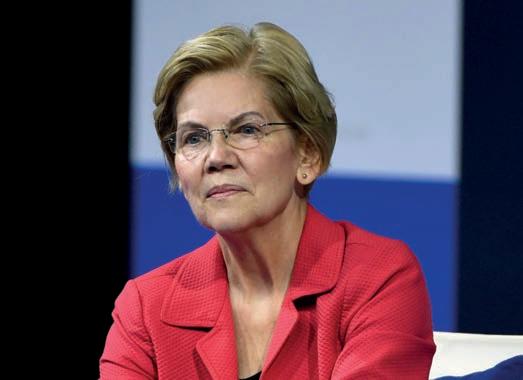
Democratic candidate Joe Biden on reports that President Trump admitted he deliberately played
PEOPLE ARE MORE LIKELY TO BE VACCINATED IF THEY TRUST THAT FEDERAL OFFICIALS ARE BASING A VACCINE DECISION ON SCIENCE
Sen. Elizabeth Warren on the Trump Administration’s politicization of the COVID-19 down the Coronavirus threat in an interview with Bob Woodward.
I WOULD LOVE TO SEE THE LEADER OF OUR COUNTRY EMBRACE MASKS AND ENCOURAGE PEOPLE TO DO THE RIGHT THING
“ME ENCANTARÍA VER AL LÍDER DE NUESTRO PAÍS ADOPTAR MÁSCARAS Y ANIMAR A LA GENTE A HACER LO CORRECTO”.
Michigan governor Gretchen Whitmer addresses the presidential campaign and events amid the
Coronavirus pandemic.
U.S. President Donald J. Trump told legendary journalist Bob Woodward on March 19 about his public strategy against the new Coronavirus.
WE ALL DO STUPID THINGS AT 17
“TODOS HACEMOS COSAS ESTÚPIDAS A LOS 17 AÑOS”.
President Trump’s son, Trump Jr., on alleged Kenosha shooter, Kyle Rittenhouse.
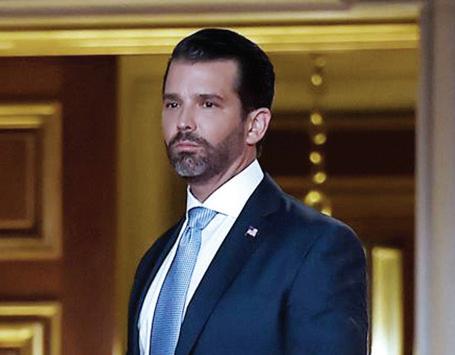
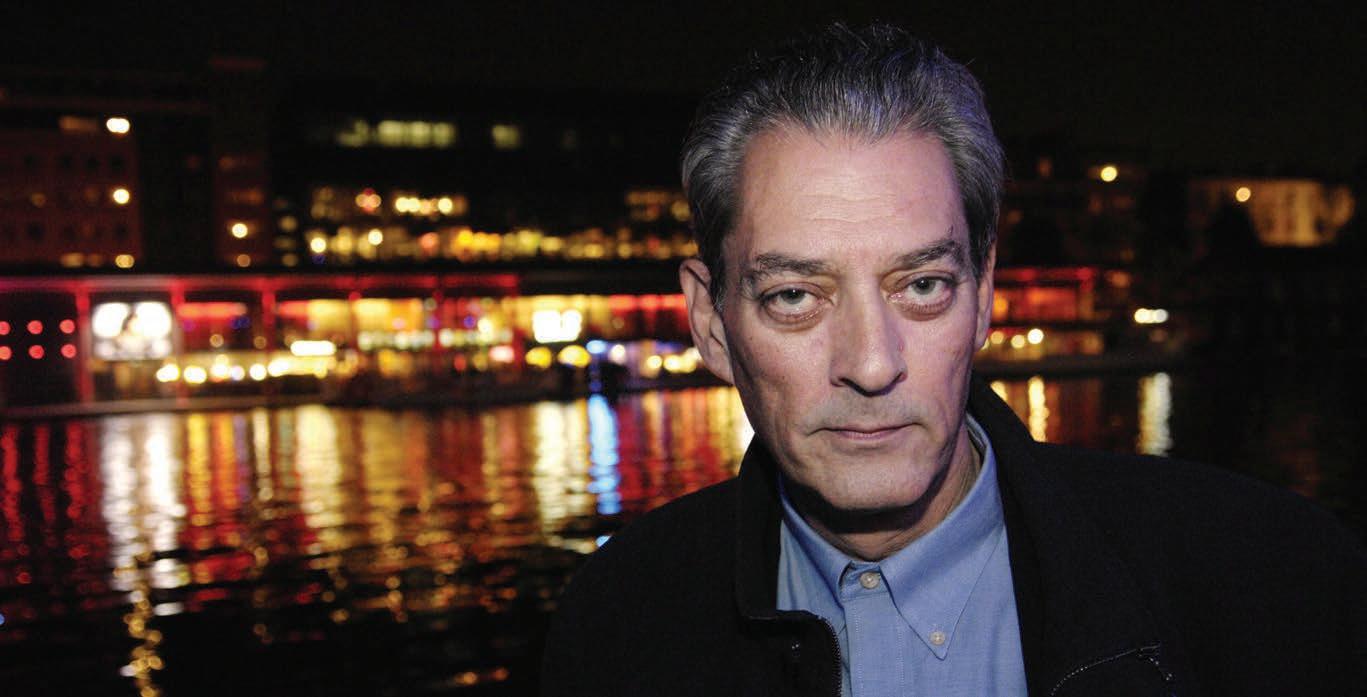
Writer Paul Auster is part of a coalition of intellectuals who, from the trenches of literature, are involved in political activism against President Donald Trump. Photo by GettyImages El escritor Paul Auster, quien forma parte de una coalición de intelectuales que, desde la trinchera de la literatura, se involucra en el activismo político contra el presidente Donald Trump.. Foto de GettyImages
CAN LITERATURE SAVE US FROM TRUMP? AUTHORS SUCH AS VALERIA LUISELLI AND PAUL AUSTER CALL FOR GREATER ACTIVISM BY INTELLECTUALS IN ELECTIONS TO ENCOURAGE YOUNG VOTERS.
AUTORES COMO VALERIA LUISELLI Y PAUL AUSTER REIVINDICAN MÁS ACTIVISMO INTELECTUAL EN LA CAMPAÑA ELECTORAL.
By | Por: BEATRIZ GARCÍA AL DÍA News Content Producer
With only three months left for the elections, you no longer need to be a magician to foresee the political and social scenario if Trump is reelected.
That's why writer Paul Auster has pulled the strings of his responsibility as a writer and citizen to call for political change.
“We are launching an emergency message, especially to young people: go out and vote,” said Auster during his talk
ENGLISH
last Sept. 4 with Mexican author Valeria Luiselli at the Hay Festival in Querétaro. A conversation centered on U.S. politics in which both Auster and Luiselli — who has documented detained immigrants’ situation, especially children — represent two pillars of U.S. progressivism.
“Intellectuals must move on to more radical activism to succeed, beyond giving our opinions, to think about what we are going to do to get out of this chaos together,” suggested Luiselli, the author of The Lost Children.
ESPAÑOL
Atres meses escasos de las elecciones, cuando ya no hace falta ser mago para prever cuál será el escenario político y social si Trump vuelve a ganar, el escritor Paul Auster ha tirado de veta de su responsabilidad como escritor y como ciudadano para llamar al cambio político.
“Lanzamos un mensaje de emergencia, sobre todo a los jóvenes: salgan y voten”, aseguró Auster durante la charla que mantuvo el pasado viernes con la autora mexicana Valeria Luiselli en el marco del Hay Festival de Querétaro. Una conversación muy centrada en la política estadounidense en donde tanto Auster como Luiselli, que ha documentado la situación de los migrantes en los centros del ICE, especialmente los niños, representan dos pilares del progresismo norteamericano.
“Es urgente que los intelectuales pasen a un activismo más radical para tener éxito, más allá de dar nuestras opiniones, pensar qué vamos a hacer para salir juntos de este caos”, sugirió a su vez la autora de Los Niños Perdidos.
ENGLISH
Of course, Auster was already on it.
The writer of Moon Palace was one of the first and most combative members of Writers against Trump, a coalition of intellectuals who want the current President to be defeated and encourage disgruntled citizens to exercise their right to vote.
In the group's ranks are some of the most critical minds in poetry and prose of the country, such as Siri Husvedt — Auster's wife —, Margaret Atwood, Carolyn Forché, and Natasha Trethewey, and also Latinx writers like Julia Alvarez, Robert López, Edwin Leslie Contreras Schwartz, and the Mexican Carmen Boullousa.
“I was born in Mexico City. I am here proudly to join the Writers Against Trump movement. I have seen how he mistreats my people. I have seen who he is. It's not just America's future that's at stake: it's the entire Earth,” Boullousa enthusiastically stated in a video posted on the group’s site.
Part of the initiative is encouraging authors to write a short statement about the importance of the upcoming elections and why it is critical for them, and post this statement on the site and the group's Instagram account.
Luiselli, who is not at the moment among the members of Writers Against Trump, maintains her belligerence against a government that feels hostile to the Mexicans, but does so in her own way:
“I give students literature to light the fuse, go out, and vote," the writer said at Hay Festival, adding that books are a social change tool.
The group Writers Against Trump not only makes no secret of its support for Biden-Harris, but is organizing readings and webinars in support of their campaign, and encourages writers to volunteer to speak at both Democratic leaders' events.
ESPAÑOL
Por supuesto, Auster ya estaba en ello.
El autor del Palacio de la Luna fue uno de los primeros y más combativos integrantes de Writers against Trump, una coalición de escritores que quieren la derrota del actual presidente y animan a los ciudadanos descontentos a que ejerzan su derecho al voto.
En las filas del grupo figuran algunas de las mentes, la poesía y la prosa más soberbias del país, como la escritora Siri Husvedt -esposa de Auster-, Margaret Atwood, Carolyn Forché o Natasha Trethewey, y también escritores latinx como Julia Álvarez, Robert López, Edwin Leslie Contreras Schwartz o la mexicana Carmen Boullousa.
“Nací en la Ciudad de México. Estoy aquí con orgullo para unirme al movimiento Escritores contra Trump. He visto cómo maltrata a mi gente. Mi gente. He visto quién es. No sólo está en juego el futuro de América: está en juego toda la Tierra”, declaró entusiasta Boullousa en un video publicado en el site de Writers Against Trump.
Parte de la iniciativa consiste en que los autores que quieran participar escriban un pequeño statement sobre la importancia de las próximas elecciones y por qué son clave para ellos, y publiquen esta declaración en el site y en la cuenta de Instagram del grupo.
Luiselli, que no se encuentra de momento entre los integrantes del colectivo, mantiene a su vez su beligerancia contra un gobierno que siente hostil con los mexicano, pero lo hace a su propia manera:
“Les doy a los estudiantes literatura para encender la mecha, para que salgan a votar”, dijo la escritora en Hay Festival, y añadió que los libros son una herramienta para el cambio social.
El grupo Writers Against Trump no sólo no oculta su apoyo a Biden-Harris, sino que está organizando lecturas y seminarios virtuales en apoyo de su campaña, y anima a los escritores a ofrecerse voluntarios para salir a hablar en los eventos de ambos líderes demócratas.
Writer Valeria Luiselli, who also takes part in the group “Writers Against Trump.” Photo by AP La escritora Valeria Luiselli, quien forma parte del grupo “Escritores contra Trump.” Foto de AP
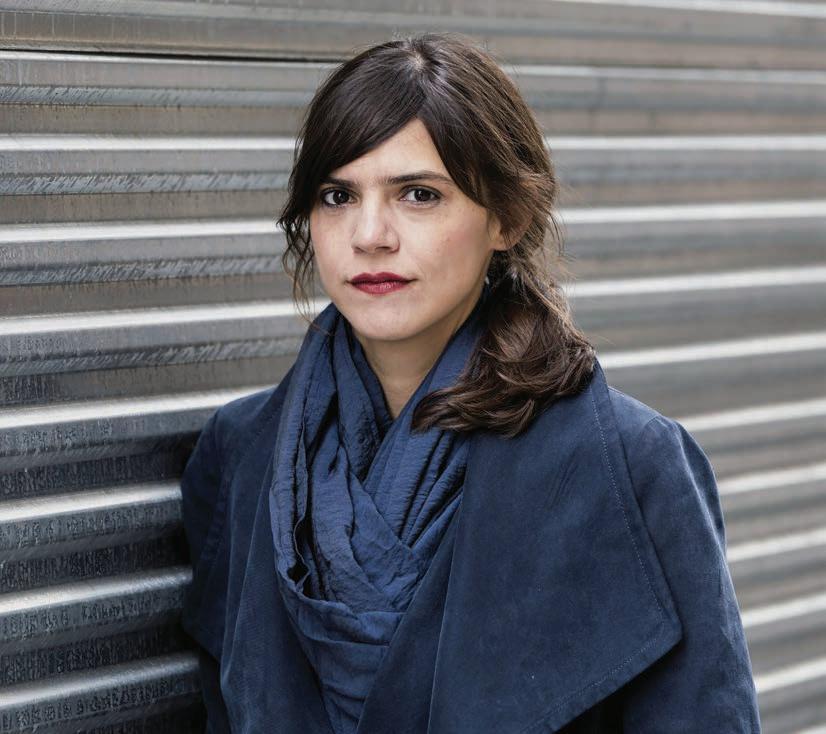
La reunión de la Junta de la PHA tendrá lugar a las 3 p.m. del 17 de septiembre de 2020, como se publicó anteriormente, sin embargo será una reunión virtual. Los procedimientos de participación están actualmente alterados debido a la pandemia de COVID-19 y la información sobre cómo participar en la reunión o hacer comentarios se puede encontrar en: www.pha.phila.gov.








